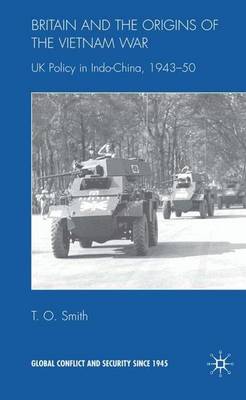Global Conflict and Security Since 1945
1 total work
Offering a bold new interpretation of British foreign policy, Britain and the Origins of the Vietnam War deftly examines Britain's involvement with Vietnam from Churchill's World War II deliberations - about Roosevelt's desire to remove Indo-China from the French Empire - to the zenith and subsequent unravelling of British foreign policy in 1950. Using archival and private papers from Britain and France, Smith argues that Britain did not unilaterally restore Indo-China to France following World War II but pursued an active interest in Vietnamese and Cambodian affairs for strategic and humanitarian reasons. Smith offers a new defence of the controversial actions of the British liberation force commander, Major-General Douglas Gracey, and contrasts British and French attitudes towards Asian nationalism and the common problem of communism. This Anglocentric study produces a new insight into British foreign and imperial policy during the formative years of the Vietnam War.
